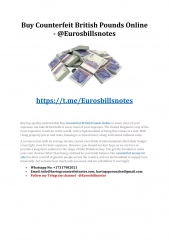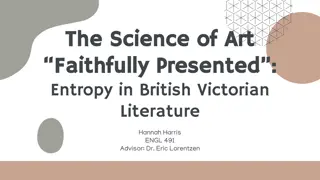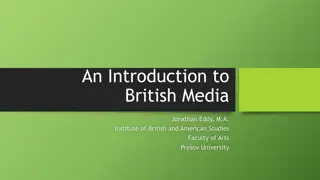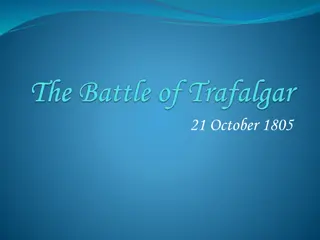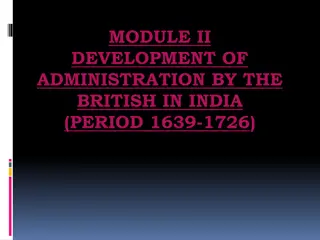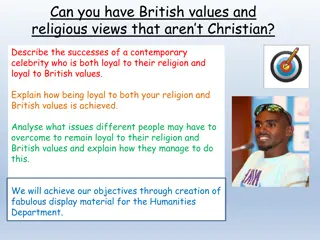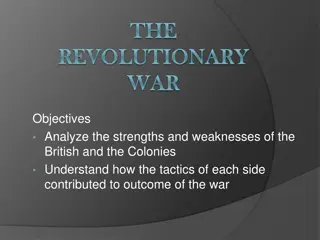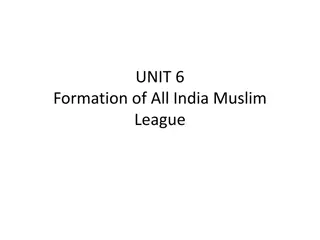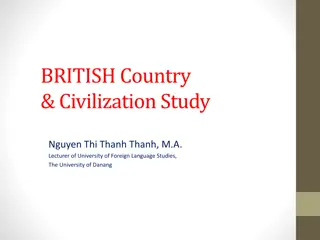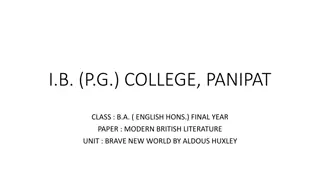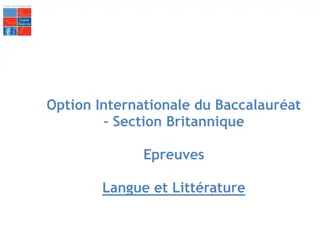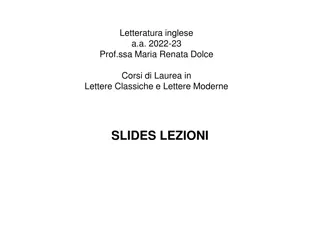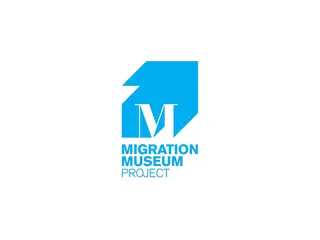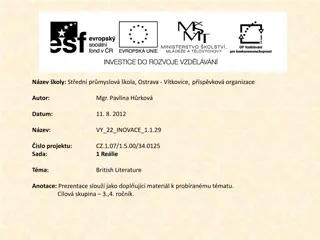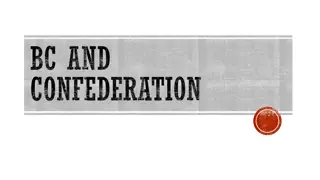BRITISH LITERATURE
This insightful analysis delves into William Wordsworth's poem "My Heart Leaps Up," discussing its themes, structure, and significance. The poem reflects Wordsworth's enduring connection to nature and the timeless joy he finds in simple beauty like a rainbow. Through a series of stanzas, the poet contemplates life, growth, and the continuity of wonder across ages. Explore the profound sentiments captured in this classic piece of British literature.
Download Presentation

Please find below an Image/Link to download the presentation.
The content on the website is provided AS IS for your information and personal use only. It may not be sold, licensed, or shared on other websites without obtaining consent from the author.If you encounter any issues during the download, it is possible that the publisher has removed the file from their server.
You are allowed to download the files provided on this website for personal or commercial use, subject to the condition that they are used lawfully. All files are the property of their respective owners.
The content on the website is provided AS IS for your information and personal use only. It may not be sold, licensed, or shared on other websites without obtaining consent from the author.
E N D
Presentation Transcript
BRITISH LITERATURE Lecturer: Cam Lien, M.A Email: camlien0104@gmail.com Phone: 0947320041
My Heart Leaps Up -William Wordsworth-
William Wordsworth (1770 1850) William Wordsworth, (born April 7, 1770, Cockermouth, Cumberland, April 23, 1850, Rydal Mount, Westmorland) England died English poet whose Lyrical Ballads (1798), written with Samuel Taylor Coleridge, helped launch the English Romantic movement.
My Heart Leaps Up -William Wordsworth- It was likely prompted by one of the many long walks Wordsworth took with his sister Dorothy through the Lake District region of northern England. Dorothy's well-kept journal of their daily life while living there reveals that Wordsworth wrote the poem on March 26, 1802. Mostly, the poem is set in the poet's own mind, where he thinks on his life from childhood, to the present, and onwards into the future.
My Hearts Leaps Up -William Wordsworth-
9 The entire poem has _______ lines. This poem is in_____________period in English literature. The rhyme scheme of the poem is __________ Romantic ABCCABCD D
My heart leaps up when I behold A A rainbow in the sky: B So was it when my life began; C So is it now I am a man; C So be it when I shall grow old, A Or let me die! B The Child is father of the Man; C And I could wish my days to be D Bound each to each by natural piety. D
Discuss in group 1. Summarize the poem 2. Explain the meaning of each stanza 3. Analyze Figures of speech in the poem
Summary This poem begins with a reference to a rainbow. Whenever Wordsworth beholds it, his heart gets filled with enthusiasm and energy. It is not that the sensation of joy existed in his heart when he was a child. As an adult, he still enjoys the beauty of a rainbow. He wishes to retain this childish self even if he matures and grows old. If it does not happen, he will embrace death unquestionably. According to him, nature, symbolized by the rainbow, will always be divine, and he thinks it should be for everyone.
Themes This poem consists of the following themes: nature, childhood, beauty, and aging. The main theme of this piece like most of his poems is nature and the beauty in it. For him, nature is a true embodiment of God. A glimpse of the rainbow is like having glimpses of the divine entity. The rainbow is nothing other than a bridge that connects poets to the spiritual self. He wishes never to lose touch with nature even if he grows old. The theme of childhood is another important aspect of this piece. This theme is present in the third and seventh lines. Besides, the theme of aging is displayed in the fifth line.
Line 1-2 My heart leaps up when I behold A rainbow in the sky: In the first lines of the poem, Wordsworth explains his reaction to a rainbow. It s obvious that the poet has a deep affinity for the natural world. He says, My heart leaps up This is an extreme reaction to a not uncommon meteorological event. Rainbows are, universally, regarded as beautiful, but the rainbow in this poem is a symbol of nature as a whole. Wordsworth s reaction is somewhat extreme. Most grown men do not react with the same level of enthusiasm to a rainbow. As the poem goes on, however, he will argue that we should all share his sense of wonder.
Line 3-4 So was it when my life began; So is it now I am a man; In these lines, the poet describes that he has always felt the same visceral, joyous reaction to a rainbow and to nature as a whole. His sense of wonder began when he was born and persisted throughout his childhood, into his adulthood. Wordsworth has been a fan of nature from the very start. Both lines begin similarly with the word So . This device (anaphora) is used to emphasize his idea. It also helps readers to understand that the meaning of these lines is internally connected.
Line 5-6 So be it when I shall grow old, Or let me die! Wordsworth gets a bit extreme in these lines. First, he states that he hopes to continue to be mesmerized by nature well into old age. Then, he says Or let me die! The fairly unambiguous interpretation here is that the poet would rather die than find the world around him boring and bereft of beauty. Death would be preferable to becoming a jaded cynic who cannot grasp the wonder of nature.
Line 7 The Child is father of the Man; This is, perhaps, the most important line of My Heart Leaps Up . In his typical fashion, Wordsworth gives a seemingly straightforward metaphor, which actually has enormous implications. All people were once children, so the line makes some sense on that level. We come from children as children come from their parents. The greater implication is that, as a parent, a child can be a great teacher and a great role model. Children are constantly experiencing the world as if for the first time. They have an unending sense of wonder and awe regarding nature and, indeed, life itself. Wordsworth is saying we should be like children in this way and that we should hold on to our childhood sense of the world.
Line 8-9 And I could wish my days to be Bound each to each by natural piety. In the last two lines of the poem, Wordsworth closes by reiterating the idea that he hopes to continue being in awe of nature. He wants every day to be tied together by an ongoing theme of love for the world. The words natural piety imply that the poet considered his feeling for nature to be so reverent that seeing a rainbow was an almost spiritual experience.
Literary Devices Anaphora: is the repetition of a word or phrase at the beginning of multiple lines, usually in succession. Hyperbole: making exaggerated statements or claims not meant to be taken literally Allusion: is an indirect reference to, including but not limited to, an idea, event, or person. Paradox: a statement that contradicts itself. Personification: given something characteristics of living beings. Enjambment: a line of poetry carries its idea or thought over to the next line without a grammatical pause
Personification My heart leaps up Hearts don't leap, people do. This personification gives us an image of the heart's jubilation at the sight of the rainbow.
Hyperbole It occurs in Or let me die . This line is also a rhetorical exclamation.
Anaphora So was it when my life began; So is it now I am a man; So be it when I shall grow old,
Allusion A rainbow
Paradox The Child is father of the Man; Generally, we think the man is the father of the child because the father is the source from which something originates. We know that the role of the man is instrumental behind the birth of the child. A child can never produce a man, therefore the statement; the child is the father of the man is paradoxical
Enjambment: It is found between lines 1 and 2, 5 and 6, 8 and 9 Example My heart leaps up when I behold A rainbow in the sky:


